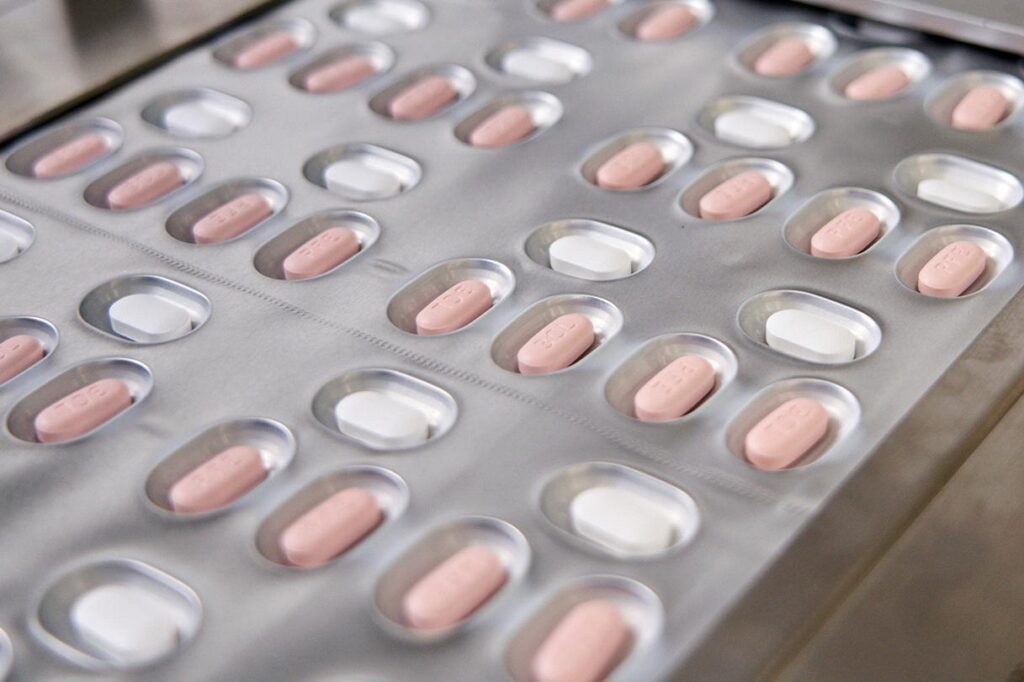
Pfizer’s COVID-19 antiviral drug Paxlovid has been hailed as a breakthrough in the fight against the disease, promising fast, convenient and dramatic protection from severe illness in older adults and others at higher risk from the virus.
But in recent weeks, there have been growing concerns that some people who finish the five-day course of prescription pills are becoming ill and testing positive again soon after. Among them this week was Dr. Peter Hotez, dean of the National School of Tropical Medicine at Houston’s Baylor College of Medicine, an expert often featured on national news broadcasts.
“Well thought COVID was over,” Hotez tweeted Tuesday, reporting that five days after completing his Paxlovid course, he had a runny nose, sore throat and “antigen test screaming +” for COVID-19. “We’ll eventually figure this out, but still a puzzle.”
UC San Francisco medical department chair Dr. Bob Wachter, who shared his wife’s journey through COVID-19 illness and Paxlovid treatment on social media with her permission, added Wednesday that they were concerned enough about the odds of a “rebound infection” that they watched TV together wearing masks — with their windows open.
Is the virus, whose mutated variants have partly evaded vaccine protection and prompted calls for multiple rounds of boosters, also finding ways to defeat the latest miracle treatment, authorized for emergency use only five months ago? Is Paxlovid still worth taking?
Medical experts say they don’t know for sure why some people who beat back a COVID-19 infection with the help of Paxlovid test positive for the virus and feel crummy again shortly after completing the medication. But they say it’s well worth taking the antiviral therapy, regardless.
White House officials reported Wednesday that the drug has become an increasingly important weapon in the fight against coronavirus, with 20,000 prescriptions a day being written across the country. They too urged people not to overreact to reports of rebound infections.
“My worry about this whole conversation is that people will lose the forest for the trees, and lose the benefit of Paxlovid,” said Dr. Peter Chin-Hong, a professor of medicine and infectious disease specialist at UCSF. “It seems to be the exception rather than rule, and so far most people get better on Paxlovid, and faster.”
Chin-Hong and others have described Paxlovid and another antiviral, Merck’s molnupiravir authorized around the same time, as game-changers in the COVID-19 fight, offering a safe, effective and convenient way to reduce risk of an infected person becoming severely ill or dying.
The antivirals are authorized for people 12 and older who are considered at higher risk from COVID-19, either due to health conditions such as obesity or diabetes, or simply because they are older.
At a time when vaccine protection is waning against new variants and monoclonal antibodies requiring intravenous infusion are losing their effectiveness, antivirals prescribed at the onset of symptoms and taken at home can help beat back infection. Pfizer’s drug blocks an enzyme the virus needs to reproduce, and was found to cut risk of hospitalization or death in high-risk adults by 89%. The Merck drug’s effectiveness is 30%.
The Bay Area and the rest of the country are seeing cases rise anew. Federal and state officials continue to urge Americans to get booster shots and wear face masks in crowded settings.
“It’s nothing to be alarmed at, at this moment,” Gov. Gavin Newsom said of the rising case counts as he received his second Moderna booster shot Wednesday in Bakersfield.
“This waning immunity is a thing of — I don’t want to say of concern — but something we need to monitor,” Newsom said. “The best protection against serious illness and hospitalization is getting vaccinated and boosted.”
Both Pfizer and the Food and Drug Administration have noted that during clinical trials, around 1-2% of patients who completed the five-day Paxlovid treatment tested positive again after initially testing negative, or showed increased levels of virus. But they said the same thing happened at similar rates among those given a placebo instead of the drug. And none of the reported rebounds led to serious illness.
“So it is unclear at this point that this is related to drug treatment,” Dr. John Farley, director of the FDA’s Office of Infectious Diseases, said in guidance to health providers posted online. “Most importantly, there was no increased occurrence of hospitalization or death or development of drug resistance.”
Chin-Hong said the rebound phenomenon isn’t new, and has been seen in other viral infections. But why it’s occurring with COVID-19 and Paxlovid is a mystery, he said.
“So many people have had such a great experience with it,” Chin-Hong said. “In my experience, maybe one person had a rebound, and they did fine, and it was milder.”
Related Articles
A third of US should be considering masks, officials say
US health secretary tests positive for COVID on Germany trip
CDC recommends COVID tests before flying this summer
‘I felt so caught in between’: Older, LGBT+ caretakers face special challenges
Coronavirus: Orange County reported 2,077 new cases and no deaths since Friday
Wachter said it was “absolutely” worth it for his wife to take Paxlovid — they are in their 60s — despite the chance of a rebound. Would taking the pills longer reduce that chance? “I wouldn’t take another course of Paxlovid, until we see real data to support it,” he said in a Twitter thread.
Pfizer spokesman Kit Longley said that “while further evaluation is needed,” and the company is monitoring data from ongoing clinical trials and safety surveillance. “We remain very confident in its clinical effectiveness at preventing severe outcomes from COVID-19 in high-risk patients.”
The state announced on Wednesday that is opening 146 tele-health sites throughout the state in the next few weeks where people can get tested and if eligible, receive antiviral drugs and other medication. Check here to find a location or visit: covid-19-test-to-treat-locator-dhhs.hub.arcgis.com.
